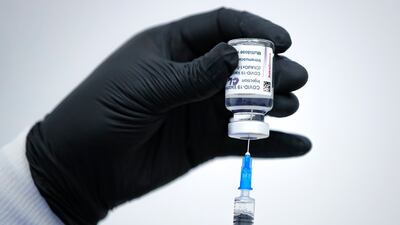AstraZeneca and the EU have settled a legal dispute over the delivery of 200 million pending Covid-19 vaccine doses.
Brussels and the Anglo-Swedish drug company have now agreed a schedule to deliver the vaccines by the end of March 2022.
This brings an end to the row which threatened to derail Europe's early inoculation efforts.
“AstraZeneca has the firm commitment to deliver – in addition to the 100 million doses which have been delivered by the end of the second quarter of this year – another 135 million doses in 2021, and 65 million doses by the end of March 2022”, European Commission spokesman Stefan de Keersmaecker said.
Having reduced its initial reliance on the drugmaker, Brussels said parts of the volume committed under the deal would be transferred outside the EU to ease global vaccine inequality.
The bloc's now mainly uses the Pfizer-BioNTech Covid-19 vaccine.
The European Commission launched legal action against AstraZeneca in April, accusing it of not respecting their supply contract and for not having a “reliable” plan to ensure timely deliveries.
Under the new agreement, member states will be provided with regular delivery schedules and if there were any delays, capped rebates will be applied, the EU's executive body said.
EU member countries with low inoculation rates will be prioritised, it added.
“There are significant differences in vaccination rates between our member states, and the continued availability of vaccines, including AstraZeneca's, remain crucial,” said EU health commissioner Stella Kyriakides.
She also said some deliveries under the settlement will go to lower-income countries outside the EU.
“We will continue helping the rest of the world,” Ms Kyriakides said.
“Our aim is to share at least 200 million doses of vaccines through Covax with low and middle-income countries until the end of this year,” she said.
Run by the World Health Organisation and the Gavi Vaccine Alliance, the Covax initiative provides vaccines to poorer countries.
The European Commission said this week that 70 per cent of the EU's adult population had been fully vaccinated – hitting a target set at the beginning of the year.
EU vaccine needs have mostly been served by Pfizer and BioNTech because they managed to ramp up production for ample supplies.
Concerns over very rare cases of serious blood clotting linked to the AstraZeneca shot have affected demand for it in the bloc.
Its use fell further when Germany decided in July that anyone who received an AstraZeneca shot as their first dose would complete their two-shot inoculation with the Pfizer-BioNTech or Moderna vaccines.
About 92 million doses of AstraZeneca's vaccine have been distributed to EU member states, according to the European Centre for Disease Prevention and Control.
That is far below the 437 million doses delivered by Pfizer/BioNTech but ahead of the 77 million from Moderna.












